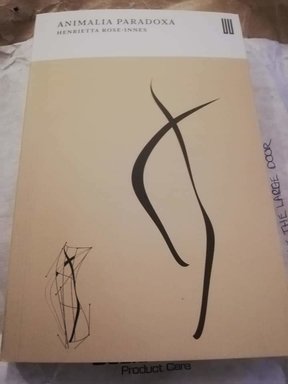
Animalia Paradoxa is one of the first fiction titles from Boiler House Press, a small imprint based at the University of East Anglia. It’s a story collection by Henrietta Rose-Innes, a South African writer whom I first read when her story ‘Sanctuary’ came second in the 2012 BBC International Short Story Award.
‘Sanctuary’ opens this collection, and it was a pleasure to read again. The narrator describes travelling to a campsite through a series of wire fence gates, and encountering a family staying at a nearby lion sanctuary. In the morning, there has been an accident: it seems the father has been attacked by a lion. But it soon becomes clear to the narrator (and us) that something else has gone on; the story is all the more powerful for what it leaves unsaid. When the narrator leaves with the family, the group passes through those gates again:
I drove through and waited while [the family’s mother] did up the complex metal knot, and then we moved on again, making good our slow, methodical escape. Over and over we did this again, locking ourselves out for good, locking it all away behind us…
At this point, the gates represent much more than a means of traversing a fence: this is leaving behind an old life, never to return.
Several of Rose-Innes’ stories work like this, with something in the environment serving as a metaphor for what’s happening to the protagonist. One of my favourites is ‘The Boulder’, which sees teenage Dan staying with his girlfriend at her parents’ holiday home. Dan feels he doesn’t belong, like the boulder which has fallen down the mountainside and now intrudes upon the lawn. The tension of that feeling builds to a wry conclusion. In ‘The Leopard Trap’, Daniela takes a breather from her marriage by driving out to stay in an unfamiliar farmhouse. She comes across a little enclosure once used by hunters for capturing leopards; her ambivalence about the place comes to reflect how she views her relationship.
Some of the stories in Animalia Paradoxa venture into more fantastical territory. ‘Limerence’ concerns a woman with a condition that induces involuntary feelings of – well, desire, if not quite love. There’s some wonderful imagery in this piece, to match the intense rush of the protagonist’s emotional state. In ‘The Bronze Age’, a man has travelled from Johannesburg to the UK, to spend a week with his son Robbie. They visit a historical site, and the man then finds that Robbie has brought home a flint knife that he feels he needs for protection. In this story, the Bronze Age represents the distance that exists between father and son, adulthood and childhood – Robbie taking part in historical activities when it’s not how his father imagined the day would go; their differing attitudes towards the knife. A closing vision of the Bronze Age itself makes the father realise just how far apart he is from his son.
I found Animalia Paradoxa an evocative and affecting collection of stories. It leaves me keen to read more of Rose-Innes’ work, and to see what else Boiling House Press has in store.
Book details
Animalia Paradoxa (2019) by Henrietta Rose-Innes, Boiler House Press, 228 pages, paperback.
Recent Comments